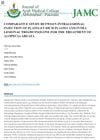Randomized Study to Evaluate the Efficacy of Platelet-Rich Plasma, Intralesional Triamcinolone Acetonide, and Intralesional Normal Saline in Moderate to Severe Alopecia Areata
April 2022
in “
Journal of evolution of medical and dental sciences
”
TLDR Intralesional triamcinolone acetonide is more effective but has a higher relapse rate than platelet-rich plasma for treating alopecia areata.
This study compared the efficacy of platelet-rich plasma (PRP), intralesional triamcinolone acetonide (ILS), and intralesional normal saline (NS) in treating moderate to severe alopecia areata (AA) in 75 patients. The ILS group showed the highest improvement in hair regrowth with a 63.15% reduction in SALT score, followed by the PRP group with a 37.51% reduction. ILS also had a faster response within 4 weeks compared to PRP's 8-12 weeks. However, the ILS group had a higher relapse rate (21.7%) compared to the PRP group (4.1%). Both treatments were safe with no significant adverse effects.





